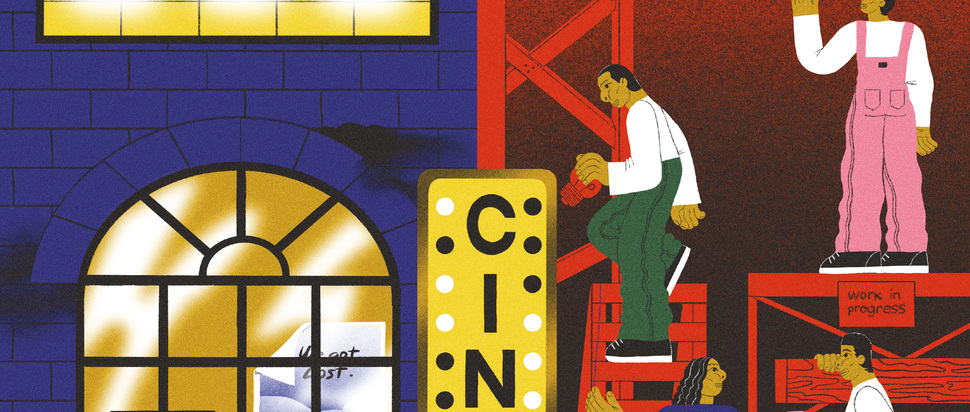Rip It Up: Building a better screen sector
Glasgow Short Film Festival's Sanne Jehoul argues that we need to build a radical new model for film – fair, diverse, full of passion, and free from neoliberal thinking
The shocking and seemingly sudden collapse of an institution as established as the Centre for the Moving Image, and cherished cinema spaces and platforms like Filmhouse, Belmont and EIFF disappearing overnight, was unthinkable and difficult to process for anyone in Scotland with a heart for independent cinema. But amid the immediate responses of hurt, outrage and solidarity, and necessary calls to save the venues and festival, it also demands we question the multiple layers of why this is such an immense loss, and look at not just this biggest of Scottish film institutions, but at the wider exhibition sector and its fragility.
Independent cinema spaces should be cherished – as hubs for community, social engagement, art form progression and resistance against a screen monoculture. In a country that is coming off years of austerity politics, severe underfunding and unstable working conditions in the arts, and neoliberal cultural policies driven by growth and commercialism, we have fewer of these hubs to cherish than in most of our European counterparts, and alternative screen culture has substantially eroded.
The loss of a cinema like Filmhouse in the nation’s capital is particularly painful because it’s the only of its kind in the city. Take it away and the entire local sector suffers along with it: non-venue organisations, film festivals and community initiatives have few other avenues to turn to; the nurturing of and opportunities for local talent reduce even further; and the exhibition sector workforce finds itself in even shakier conditions than was already the case. Because long before the shocking treatment that CMI’s staff just went through, workers across our sector – particularly those outside of the big institutions – have not been OK.
So in our calls to save these spaces, we should ask for more than just that. We should ask for more properly funded spaces and platforms, well beyond our city centres, especially as many of them have suffered from the COVID pandemic and our relationship to locality has changed. Plenty of other major cities across Europe provide an alternative to our model: a more diverse and spread out independent cinema eco-system, sustained through wider investment in infrastructure, multiple key independent venues, organisations and festivals, and therefore a more diverse programme offer and more opportunities for career paths in the field. It would increase the sustainability for non-venue organisations and freelance practitioners, and allow more space for niche programming, experimentation and risk-taking, all of which help nurture local talent and develop audiences’ hunger for a genuinely exciting and innovative screen landscape.
Of course, such investment requires long-term thinking, but as we’ve seen with CMI, the current approach isn’t sustainable. Because it isn’t just fuelled by the recent crises we find ourselves in. It is because leadership in our biggest institutions have been prioritising monolithic thinking and expansion – not in the least over fair staff treatment – and have been allowed to do so, in many cases against a backdrop of unacceptable pay discrepancies.
It is because funding priorities are dominated by commercial, growth and status interests and lack focus on art form innovation or community investment, or on how the grassroots can benefit the institutions and vice versa. It is because outside of the few (clearly not so) stable institutions we have, the top of our industry is turning a blind eye to the underfunding and self-exploitation at the core of the exhibition sector, causing burnouts, talent drains, and neglect of genuinely radical and socially engaged initiatives that surely should be at the core of the arts.
It can be defeating to dare rethink these structures. Like the rest of the UK’s public services, any healthy buffer for sustainability has eroded over the years, and in this time of immense crisis, it feels impossible to dream beyond tomorrow. But in what is still one of the wealthiest economies in the world, how can we not at least have the structures of some of our European counterparts?
The multiple and substantial levels of arts funding – national, regional, council – in countries like Germany, France and Austria allow for a much richer cinema landscape where anything from the mainstream to the experimental can co-exist and feed into each other. Valuing and developing that diversity would create more sustainable routes for careers and talent across the industry too. And in reconsidering how we build and rebuild, we need to move towards a culture of solidarity and collaboration that doesn’t allow for the egos, gatekeeping and disingenuity that are rampant in our sector as it is now.
Our arts institutions often still like to pretend that they are a beacon for progressive thought, that the social engagement that should be at the heart of the arts is still a key priority, but everything about our structures and priorities is being determined by the same neoliberal thinking that we purport to resist. What we need is the space and investment in more people and platforms that genuinely care about cinema beyond commercial outlooks and prestige, to treat them as the spaces for radicalism in form, ideas and activism that the arts should stand for. We need a sector led by those who care about workers, let them progress, and allow for other people’s visions, for collective approaches. Especially now, when we are living in a time of intense crisis. If we’re to save what’s lost, then surely at the forefront should be notions of urgency, necessity, community and social action.
Sanne Jehoul is the programme director at Glasgow Short Film Festival and works across the short film slate of festival distribution agency Square Eyes
